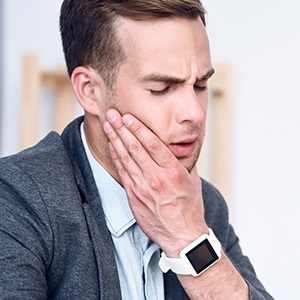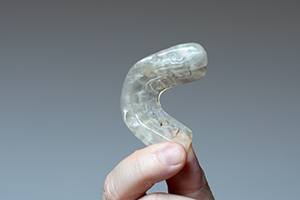TMJ Therapy – Palm Bay, FL
Relieve Jaw Pain & Restore Full Range of Motion
 The temporomandibular joints (TMJ) connect the jaw and the skull bone. When these small connective tissues function properly, the result is smooth, painless movement when eating, speaking, and smiling. If the TMJ are damaged or strained, patients can experience a number of adverse effects while completing even the simplest daily functions. When this occurs, the resultant oral health condition is referred to as TMJ dysfunction or simply as TMD. If you think you may be experiencing TMD, please don’t hesitate to contact Beautiful You Dental to schedule a consultation to discuss TMJ therapy in Palm Bay, FL.
The temporomandibular joints (TMJ) connect the jaw and the skull bone. When these small connective tissues function properly, the result is smooth, painless movement when eating, speaking, and smiling. If the TMJ are damaged or strained, patients can experience a number of adverse effects while completing even the simplest daily functions. When this occurs, the resultant oral health condition is referred to as TMJ dysfunction or simply as TMD. If you think you may be experiencing TMD, please don’t hesitate to contact Beautiful You Dental to schedule a consultation to discuss TMJ therapy in Palm Bay, FL.

TMJ Diagnosis
The first step is to definitively diagnose TMD. As a dental office, we are dedicated to neuromuscular dentistry. This is the study of how the oral and facial structures interact and how we can improve the comfort and efficacy of these movements. TMD is one of the main disorders we diagnose and treat using the philosophies of neuromuscular dentistry. We’ll screen for the disorder during each appointment, but we encourage patients to let us know if the experience any of the following symptoms:
- Pain when opening and closing the mouth
- Clicking and grinding sounds when opening and closing the mouth
- Impeded movement or complete inability to move the jaw
- Pain in head, neck, or shoulders
- Earaches and ringing in ears
- Chronic headaches

Occlusal Splints
An occlusal splint is one of the simplest and most commonly used treatment options for TMD sufferers. These oral appliances are custom crafted and typically adjustable. Patients wear these appliances during sleep, and the goal is to position the jaw in its ideal resting place. This repositioning at night relieves strain on the joints, prevents unconscious jaw movement, and retrains the jaw to naturally rest in a more comfortable position.
TMJ/TMD Therapy Frequently Asked Questions
What Causes a TMD?
There are plenty of ways your TMJ could become damaged. For example, grinding teeth in Palm Bay tends to put unnecessary stress on the muscles in your jaw, leading to pain as well as worn down enamel. Other causes include jaw misalignment, a severe oral injury, poor posture, stress, arthritis, and excessive gum chewing. In many cases, there’s more than one contributing factor, and we’ll need to take them all into account before recommending treatment.
Is My TMD Responsible for the Headaches I’ve Had Lately?
TMD is one possible cause of recurring headaches. The tension in the TMJ muscles that run along your jaw and cheeks can easily lead to pain that can spread to other parts of your head. It can be hard to tell the difference between a general headache and a headache related to TMD, but normally the latter will be accompanied by other symptoms such as tight jaw muscles, facial pain, a clicking sound, restricted movement in your jaw, and a change in the way your top and bottom teeth fit together. Treating your TMD could also help relieve your headaches.
Does a Popping Jaw Joint Mean I Have a TMD?
If your jaw “pops” – meaning you hear a clicking sound whenever you open or close it – it’s not necessarily a cause for concern. Sometimes it’s simply a side effect of opening your mouth too wide when yawning. If you only notice occasional popping without any accompanying pain, you probably won’t have anything to worry about. On the other hand, if your jaw does hurt, there’s a good chance the clicking sound is actually related to a TMD that requires treatment. (And of course, other symptoms such as a ringing in your ear should also be treated as a warning sign.)
What If I Don’t Treat My TMD?
Choosing not to treat your TMD means living with the pain it causes, which could grow worse over time. The constant discomfort could even disturb your sleep or might contribute to depression. Also, if your TMD prevents your jaw from functioning properly, you may have a hard time eating different kinds of foods and could thus suffer from malnutrition. Eventually, you could even develop a locked jaw, meaning your mouth will be permanently stuck open; you’ll have to visit a hospital emergency room.
The most extreme consequences of a TMD become more likely the longer you leave the problem alone. That’s why it’s best to get in touch with us as soon as possible to have your jaw pain addressed.
 Beautiful YouDental
Beautiful YouDental